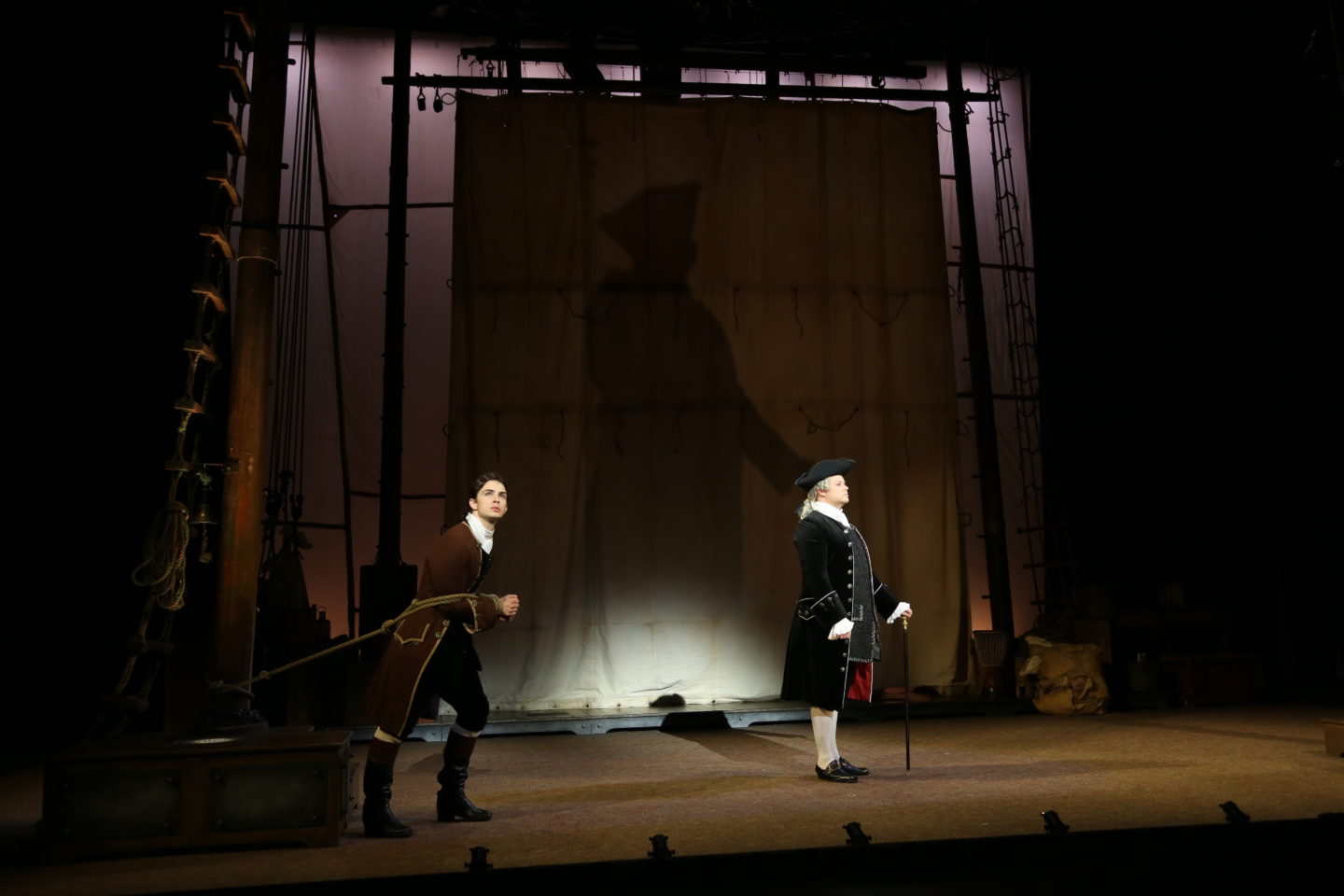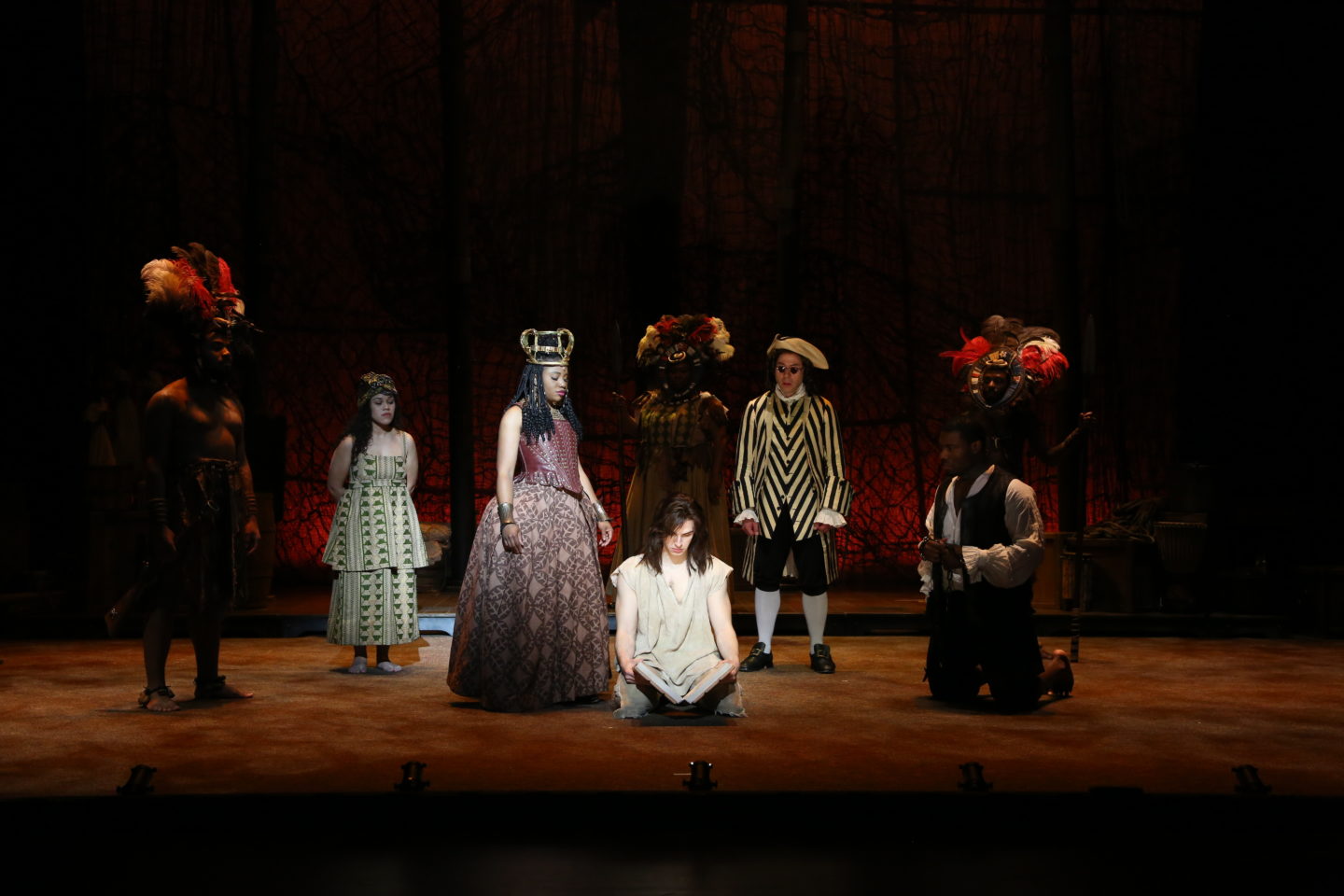In 2017, the Broadway musical Amazing Grace opened its national tour with a stint at the World Stage Theater at Washington, D.C.’s Museum of the Bible. (DC Metro Theatre Arts’ review of that production can be read here.)

Now Amazing Grace is back, but the show that once ran nearly three hours has been streamlined to about half that length. (The show’s promotional material lists the running time as 90 minutes; the matinee performance on Saturday, March 30, clocked in at about 105 minutes.) Songs and scenes have been shortened, and occasionally even cut or replaced, to tell the story of slave trader-turned-minister/hymnwriter John Newton in a manner that director Gabriel Barre deems “even more theatrical.”
Indeed, the tightening up has served the show well. The story moves along at a brisk pace that holds the audience’s attention, without sacrificing clarity or emotion, and Christopher Smith’s songs meld with and support the narrative nicely. The cast handles these superbly, all the more notable since they have to sing to prerecorded tracks – not an ideal arrangement, but at least done as professionally and smoothly as it possibly could be. The use of snippets of “Rule Britannia” to replace a couple of the songs feels a bit shoehorned, and yet the writers manage to use the lyric “Britons never, never, never shall be slaves” to suitably ironic effect.
If the latter part of the show features a few too many coincidences and other well-worn plot devices, it still manages to remain unpredictable and fascinating. John’s own story – which includes being impressed into the British navy, and even being captured and enslaved himself – is, incredible as it seems, largely drawn from real events. By contrast, the story of Mary Catlett, the woman who loves him, is heavily fictionalized. But it allows her to play a foil to the man she cares about, showing her becoming increasingly involved in abolitionist activities even as John sinks deeper into the slave trade, backing up her warnings to him with courageous actions of her own. It also offers a little comic relief as she strives to deal with pompous suitor Major Gray, a delightfully fussy Steve Quintilian.
Barre and the show’s writers, Smith and Arthur Giron, are not afraid to jar our sensibilities – for instance, by juxtaposing young Newton’s exuberant “Truly Alive,” a Disney-like ode to adventure and freedom, with a scene of a cold-eyed Newton auctioning off and branding terrified slaves. They also make sure to show us the lives, backgrounds, and emotional arcs of many of the slaves, including the wrenching story of Nanna, who was torn from her beloved daughter and sold into slavery. The show underscores its theme by demonstrating that these slaves are three-dimensional people, not just tools in Newton’s redemption. Their sufferings are described and shown without flinching, and their forgiveness and trust are not easily earned.

Some of the actors from the previous DC run have returned, including Eleanor Todd, who brings a stellar voice and lively wit to the role of Mary, and Kelli Blackwell, who plays Nanna with implacable dignity. Don Seward took over the key role of Pakuteh (Thomas), the Newton family’s slave who evolves from John’s protector to his accuser. But at the performance attended by this reviewer, Seward was out, and Isaiah Bailey – who had previously played the role in DC – went on for him, giving a powerful performance. Matt Mitchell commits fully to the complicated role of John Newton, portraying his ugliest aspects with as much sincerity as his journey toward repentance. Other standouts, vocally and dramatically, include Alex De Bard as Yema, Nanna’s long-lost daughter, and Debora Crabbe as Princess Peyai, Newton’s captor.
Eugene Lee and Edward Pierce’s sets are simple but serviceable; the ship’s rigging that frames the action is a constant reminder of the slave trade at the heart of the show, even as furniture and props transform the stage as needed. Toni-Leslie James’s opulent period costumes are a particular highlight. On the whole, Amazing Grace offers much to enjoy – and even more to think about when the last notes have faded away.
Running Time: 1 hour and 45 minutes, with no intermission.
Amazing Grace plays through August 18, 2019, at the World Stage Theater in the Museum of the Bible, 400 4th Street SW, Washington DC. Tickets can be purchased online.





Show “Amazing Grace” last night. It is amazing!!! Loved it!!! If you have the chance to go, GO!!! You will not be disappointed!
Saw “Amazing Grace” last night. It is amazing!!! Loved it!!! If you have the chance to go, GO!!! You will not be disappointed!